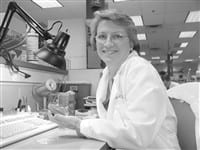Comprehensive Breast Center’s Fast Track Service Helps Reduce Anxiety
SPRINGFIELD — Waiting isn’t always easy, especially when a diagnostic procedure finds something suspicious requiring additional testing, like when a patient learns there is an abnormality on her mammogram and she needs to have a core biopsy.
Then it can seem like an eternity waiting for the second scheduled test, even though it might only be a week or two away.
That’s why Baystate’s Comprehensive Breast Center, part of the Baystate Regional Cancer Program, has implemented a new Fast Track service that can significantly reduce the time between an abnormal mammogram or breast ultrasound and biopsy, assure adherence to high-quality guidelines, and, in the event that cancer is found, reduce the time to definitive treatment.
“It shortens the time of uncertainty and anxiety, which means a lot to patients,” said Dr. Holly Mason, director of Breast Surgery at Baystate Medical Center.
With Fast Track, the patient’s physician agrees in advance that, should an abnormality be detected on the mammogram, permission is granted to perform a biopsy, if indicated. The next steps happen immediately. A nurse practitioner at the Comprehensive Breast Center assumes coordination of the patient’s care, completing a health history, performing a physical, and scheduling the ultrasound and core biopsy as soon as possible. Having a clinician examine the breast prior to a biopsy to see if the lesion can be felt provides valuable information. The breast center’s state-of-the-art stereotactic or ultrasound guidance equipment is used for the biopsy, which generally occurs within days.
Such was the case recently for Sharon Motyl. It all began with a routine annual mammogram at the Comprehensive Breast Center for the 55-year-old Chicopee resident. The result of the exam raised concern with the radiologist who read it, so the staff contacted Motyl for an additional mammogram.
“They got me in quickly,” she said. “In fact, it was the very next day.”
But when the second mammogram couldn’t provide a conclusive result, Motyl needed an ultrasound. “Again, I wanted to do it right away,” she said.
And because her doctor had agreed to have her be part of the Fast Track service, the speedy ultrasound test was possible.
The ultrasound showed what looked like a cyst, but not with complete certainty. A biopsy was needed for confirmation. “I was very upset,” said Motyl, already a survivor of uterine cancer. A needle biopsy was scheduled and performed the next day. And the results were good — the cyst was benign, and she could rest easy.
According to Dr. Grace Makari-Judson, medical director of the Comprehensive Breast Center, the Baystate Regional Cancer facility is a place where health professionals are able to integrate breast care between the specialties of radiology, breast surgery, and medical oncology.
“Fortunately, most breast lumps and abnormal mammograms such as Sharon’s are benign. However, for those women who are found to have a high-risk lesion or breast cancer, the next steps are carefully planned,” she said.
Baystate’s breast surgeons, medical oncologists, and radiation oncologists work together to evaluate treatment and discuss options with each patient. Each newly diagnosed patient’s treatment recommendations are reviewed at a weekly, multidisciplinary breast pathology conference, during which radiologists provide second opinions on breast imaging, and breast pathologists review details from biopsy and surgical specimens under the microscope. The multidisciplinary group of clinicians provides consensus as to treatment options, which may also include clinical trials.
While this is exciting progress, Makari-Judson noted there are still women who do not take advantage of early detection at all, and others who do not get screening mammograms and clinical breast exams at regular intervals.


